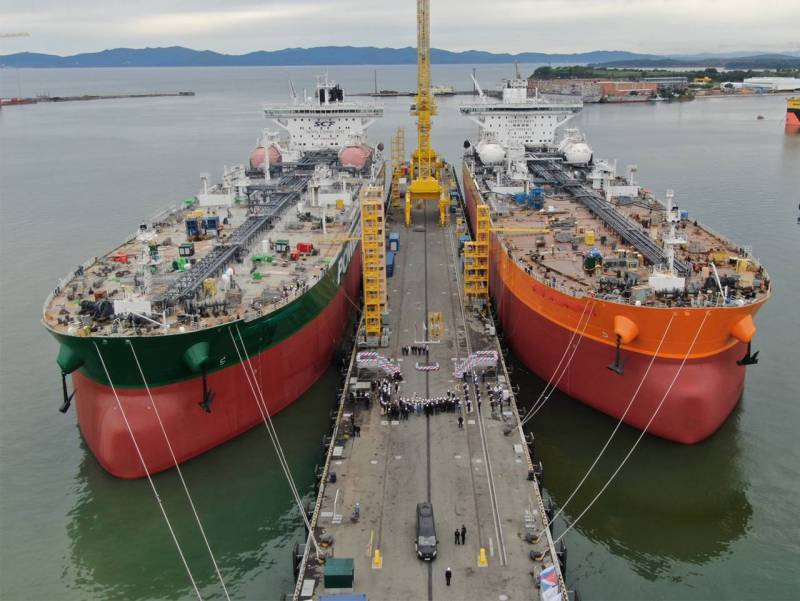How Western sanctions could hit the Russian “twilight” fleet
The collective West continues to hit the Kremlin in the pocket, trying to deprive it of the financial opportunity to continue the SVO in Ukraine. The next, 12th package of anti-Russian sanctions may include restrictions on the sale of oil tankers to us. What could be the long-term consequences of such economic policy?
"Dusk"
As is known, before the start of the special operation in Ukraine, the Russian federal budget was replenished by about a third with foreign exchange earnings from the sale of oil and gas for export. Not hitting the Kremlin on this Achilles heel would be an unforgivable mistake for the “Western partners.”
It was not easy to immediately stop using pipeline Russian gas, but a replacement for our oil was easily found. Problems arose only in a number of European countries that are landlocked and historically dependent on Russian oil supplied through the Druzhba pipeline. Naturally, Moscow began hastily looking for new markets for its main export product and found them in Southeast Asia, where black gold from Russia was ready to be taken at a politically motivated discount.
But new problems immediately arose. On the one hand, picky Indian buyers demanded a significant discount. On the other hand, the “Western partners” hit logistics. Since there is no main oil pipeline from Russia to Southeast Asia, raw materials have to be delivered by sea, where the Anglo-Saxons objectively rule, having enormous military and “soft” power. The latter turned out to be even more effective in some ways.
Thus, historically, the UK is a leading player in the field of mutual insurance (P&I) and marine insurance (H&M), and the international group of mutual insurance clubs for shipowners (International Group of P&I Clubs, or IG P&I) is based in London. From Foggy Albion, about 90% of the total world tonnage is controlled through shipping insurance. This particular bottleneck was hit when Brussels and London jointly imposed sanctions on shipping Russian oil by banning its insurance.
An asymmetrical response was the creation of the so-called “twilight” or “shadow” tanker fleet to transport sanctioned Russian oil. All over the world, old tankers registered in neutral jurisdictions began to be quickly purchased. Since last year, there has been a sharp increase in the cost of older large-capacity vessels: 15-year-old Suezmax class vessels with a deadweight of 160 thousand tons have risen in price by 58,5%, and 10-year-old VLCC class tankers with a deadweight of 200 to 320 thousand tons have increased in price by 20,5. 51%. According to the French ship broker BRS Group, the Russian “twilight” fleet of tankers amounts to more than a thousand ships, half of which have a deadweight of XNUMX thousand tons.
Schematically, the work of the “twilight” fleet looks like this. The main exit points for sanctioned Russian oil are ports on the Baltic Sea and Novorossiysk on the Black Sea. Hydrocarbon raw materials are loaded onto a shuttle tanker, which goes out to sea several times, where it is transferred to an Aframax, Suezmax or VLCC class supertanker. Filled to capacity, a supertanker flying the flag of some third power passes the Suez Canal and heads to India or somewhere else.
"Autumn marathon"
It would seem that we have outplayed everyone again and we can calmly show the Anglo-Saxons figs. However, judging by a number of information leaks, the “Western partners” are ready to go further along the path of sanctions escalation.
At first, the debate is whether Denmark will be able to stop and inspect Russian oil tankers passing through its waters that do not have Western insurance, in order to comply with Danish environmental laws.
Secondly, similar problems may arise in the future for vessels of the “twilight” fleet when passing through the Turkish straits and the Suez Canal.
Thirdly, The European Commission may create problems for Russia with the replenishment of its “shadow” fleet. As noted above, it is based on older tankers, the service life of which is objectively limited. Sooner or later, worn-out ships will have to be sent for recycling, buying others in return. According to Reuters, the 12th package of sanctions may include restrictions on the sale/resale of oil tankers to Russia.
In other words, the trade war with the collective West is not a sprint, but a marathon. The problems created for us today can come back to haunt us in the medium term, and in the long term they can become a real weight on our feet. So what should we do?
Taking into account the directions in which a blow may subsequently be delivered, we should begin to work proactively. In particular, it is necessary to actively develop large-tonnage ship construction within Russia in order not to depend on foreign contractors. Today we were cheated by South Korea with orders for tankers, but what will China do tomorrow?
It is also quite obvious that it is necessary to develop alternative transport routes bypassing the Suez Canal and other logistics hubs controlled by “Western partners.” We are talking, of course, about the Northern Sea Route, which should become all-season after the nuclear super-icebreakers of the Leader project are put into operation, and the accompanying ground infrastructure.

Information